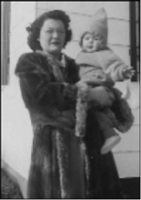We'd love to have you access this content. It's in our members-only area, but you're in luck: becoming a member is easy and it's free.
Already a Member?
Not a Member Yet?
In the previous post on point of view, I shared my challenge of trying to write point of view in a ghostwritten memoir that I knew to be true but which the subject was not forthcoming with. This is not “Truth” material. It is more the sort of reflection that a more intuitive, self-reflecting person […]
What is the importance of point of view in a memoir? In the previous post on point of view, I shared my challenge of trying to write material in a ghostwritten memoir that I knew to be true but which the subject was not forthcoming with. This is not “Truth” material. It is more the sort of reflection that a more intuitive, self-reflecting person might make to cast light on her/his life. The memoir in question is We Were Not Spoiled, a memoir I co-wrote with my mother Lucille Verreault Ledoux.
1. How to create context when a subject is not entirely aware of it.
As I was interviewing my mother, I was aware that there was much that she was saying that needed some historical and cultural context. Often there were historical facts and anecdotes that, if the story were mine, I would easily provide. But including something in someone else’s memoir requires more justification than “if the story were mine.” The story was not mine and, frankly, I had no trouble with that as I knew my mother very well and I was not talking of embarrassing content here, but the first person seemed not to offer a vehicle for introducing historical content as anyone who knew my mother (like my siblings!) would deny immediately that she had ever said such a thing.
My mother did give me tons of information. As she said in her book, “I have always been able to remember names and dates and information.” As a result, most frequently, I did not feel the need to leave the first person in the narration. In addition, the third person opened up so many opportunities for the can of worms “How do you know that” comments, that I decided not to use it.
2. The first person was always the point of view of choice in We Were Not Spoiled.
The first person narrator seemed the obvious choice. What I did with the historical information that my mother was not privy to but which might help the reader interpret the story was make ample use of footnotes. There I included definitions, broader perspectives drawn from history, follow through of what happened to some of the characters.
In the end, I feel that I have created a book that sounds like my mother and is faithful to her life. In addition, The book provides the reader with a broader context of the life of a woman born in Maine of Franco-American parents and into a working class during the early to middle part of the 20th century.
—
Have you written someone else’s memoir? Was the person forthcoming with information? Did you find yourself in a quandary about how to introduce material you felt the reader needed to know? What did you do?
—
Read the blog excerpts of We Were Not Spoiled [tagged under My Mother’s Stories] or get your own copy of the book which is available from our site store in pdf e-reader or as a paperback. Want a big boost learning how to be a better memoir writer? Invest in yourself. Invest in the Memoir Start Up Package.


No comments yet.